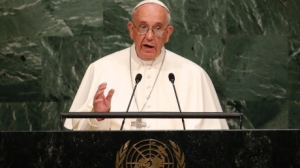As the spiritual leader of over 1.2 billion Roman Catholics, Pope Francis is a tremendously influential figure with the power to command the attention of virtual multitudes on any subject he cares to address.
In his recent trip to the United States this power was on full display in speeches Pope Francis gave at the White House and before the U.N. General Assembly. The substance of those speeches need not concern us here; suffice to say that they touched on a range of issues including the refugee crisis in the Middle East and Europe, the destruction of the environment, human trafficking, religious persecution, slave labor, war, terrorism, and organized crime.
Our point here is that it was not so much what he said that was impressive, but that what he said reached a global audience.
In doing so Pope Francis set the stage for world leaders speaking at the U.N. subsequent to his visit to issue their own calls for action on the problems he described.
As reported today (28 SEP 15) by AP correspondents covering the U.N., “Chinese President Xi Jinping pledged $1 billion for U.N. peace efforts” and “Jordan’s King Abdullah II laid out a heartfelt defense of the civil side of the Muslim world in the face of the outlaws of Islam that operate globally today.” Additionally, Russian president Vladimir Putin, “who showed up at the U.N. gathering for the first time in a decade . . . called for the creation of a broad international coalition against terror following his country’s surprising moves in recent weeks to increase its military presence in Syria and to share intelligence on the Islamic State group with Iran, Iraq and Syria.”
President Rouhani of Iran proposed that “the fight against terrorism be incorporated into a binding international document and no country be allowed to use terrorism for the purpose of intervention in the affairs of other countries” and President Obama affirmed that the United States is “prepared to work with any country, including Russia and Iran, to resolve the Syrian conflict.”
We cannot know how many of the world’s 1.6 billion Muslims heard the Pope’s words much less whether Muslims gave them any consideration at all. Should Muslims be expected to listen to the leader of the Catholic Church on any subject? Perhaps not. But this begs the question: Whom should they listen to? Who can they listen to? Where is the spiritual leader of Islam who can speak with authority on religious and temporal matters both to and for the world’s vast Muslim population? Where is the leader who can, or could, provide a focal point for discussing, addressing, and undertaking to resolve the many problems currently besetting the Muslim world?
Where indeed? Is such a leader even possible, given the nature of Islam? And if the answer to that question is no, does that mean that the aforesaid problems are insoluble?
Well might we ask. And well might we imagine: that if such a Muslim spiritual leader did exist, he would walk hand-in-hand with the Pope to deliver a joint address to the UN General Assembly on the need for people of all faiths to work together to solve those problems.
Of such things one can only dream … for now.
NES-SE is calling on large and influential Islamic nations in the world—in particular, Saudi Arabia, Turkey, Egypt, Malaysia, Pakistan, and Iran—to put aside their sectarian, political, and ethnic differences and work together to choose a spiritual leader for all of Islam. Rightly or wrongly, large numbers of non-muslim world believes that this is difficult for many Muslim countries given the history of enmity and conflict, chiefly between Sunnis and Shias, that has been ongoing almost since the time of the Prophet. But, absent such a leader, peace between Muslims, and between Muslims and the rest of the world, may be highly difficult to achieve in the 21st century.
NEC-SE 28 SEP 15
http://www.huffingtonpost.com/entry/pope-francis-united-nations_56055aefe4b0768126fd2a1e
http://www.sfgate.com/news/world/article/World-leaders-to-address-global-issues-at-UN-6533989.php



